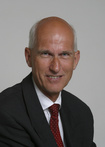Not only neurologists but also neurosurgeons, psychiatrists and pediatricians are specialists that work with disorders in the brain and nervous system. Furthermore neuroradiologists, neurophysiologists and neuropathologists are professionals in the field, as are psychologists, speech therapists, physiotherapists and many other highly educated groups. This illustrates that cooperation is absolutely necessary in the daily work and in all planning for such disorders. Neurologists should lead in the therapeutic and diagnostic work for patients with brain and nervous system disease, but this means also to coordinate and facilitate cooperation. This effort from neurology should give added value to all the elements contributed by professionals for a complex patient. Neurology expands into disorders of muscle, heart, blood vessels and other organs. Such expansion necessitates the smooth interaction with even more groups of professionals.
Neuroscience is a field in rapid development. New basic knowledge leads to better therapeutic and diagnostic opportunities. This is the main reason why neurology is one of the fastest growing medical specialists in most countries (1). Development and expansion lead to the need for subspecialisation. To secure updated and optimal treatment, most departments and practices in neurology have found it necessary to recruit neurologists with skill and knowledge in various defined subfields, such as stroke, dementia, headache, sleep, and neurorehabilitation. Subspecialisation leads to advanced treatment and also to further expansion. It should be supported. However, to keep the speciality of neurology united as a strong entity, and also to secure the whole spectre of needs for the individual patient, extensive and active cooperation is necessary (2). The neurologist needs to cooperate to secure the optimal result for each patient. Cooperation is even more important within and between units and departments. For EFNS, the cooperation and interaction at the European and international level represents a specific challenge. Neurologists working and participating in an international context secures better and more equal treatment for large patient groups.
In neuroscience and other types of medical research, a prerequisite for excellent results is specialised and focused teams where the participants have complementary skills and theorethical knowledge (3). The cooperation is confirmed by co-authorship. Similar working methods are increasingly being used in clinical neurology. Networks between neurologists and non-neurologists are often well developed and formalized. The cooperation between junior and senior doctors in specialist education is similarly regulated. The trend for extensive subspecialisation increases the need for effective and stable neurologist cooperation and interaction.
Brain development and brain disorders affect the whole life span. Neurology is relevant in the prenatal period as well as in the senium. In an ageing European population, dementia and stroke represent major challenges for the society. Acute and interventional stroke treatment has transformed neurology services and departments. Prophylactic treatment and measures to delay or avoid dementia and stroke are of fundamental interest for neurologists as well as for the society (4). Total treatment, care and prophylaxis for these disorders are complex, and definitely a multiprofessional responsibility. Neurologists should lead, and we should spearhead the joint efforts that need fine-tuned cooperative action. The effective involvement of the primary health care in patients with disorders in the brain and nervous system is necessary. Acute disorders should be immediately transferred to the specialist clinic, thrombolysis of acute stroke the everyday example. Chronic neurological disorders need neurorehabilitation and combined long-term follow-up.
Today’s medicine is specialised and with narrow fields of top expertise. This development will continue. Disorders of the brain and nervous system are complex, and patients with such disorders present themselves with a range of challenges for the health system. Neurologists are specialists in a broad medical area, and in addition often superspecialists in a narrow field. We should definitely be specialists in the field of medical cooperation as well.
References
1. Gilhus NE, Stovner LJ, Gjerstad L, Hoff JM. Partnership and cooperation is necessary to improve and expand neurology. Acta Neurol Scand 2011;124 (suppl 191):1-4.
2. Rektor I. Seek out unity as specialisation narrows. World Neurol 2010;25:4.
3. Olesen J. Collaboration to promote neurological research – the European Brain Council experience. Nature Clin Pract Neurol 2007;3:298-299.
4. Gustavsson A et al. Cost of disorders of the brain in Europe 2010. Eur Neuropsychopharm 2011;21:718-779.
Nils Erik Gilhus (MD, Prof) is Chairman of the EFNS Congress Programme Committee
Department of Clinical Medicine, University of Bergen and Department of Neurology, Haukeland University Hospital, Berger, Norway




